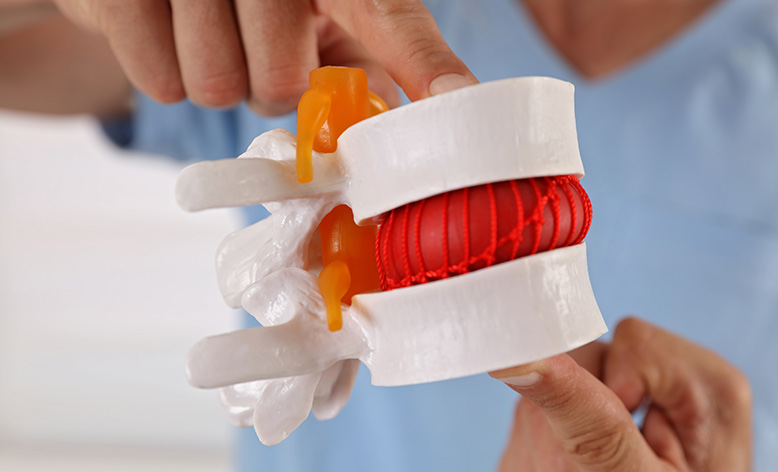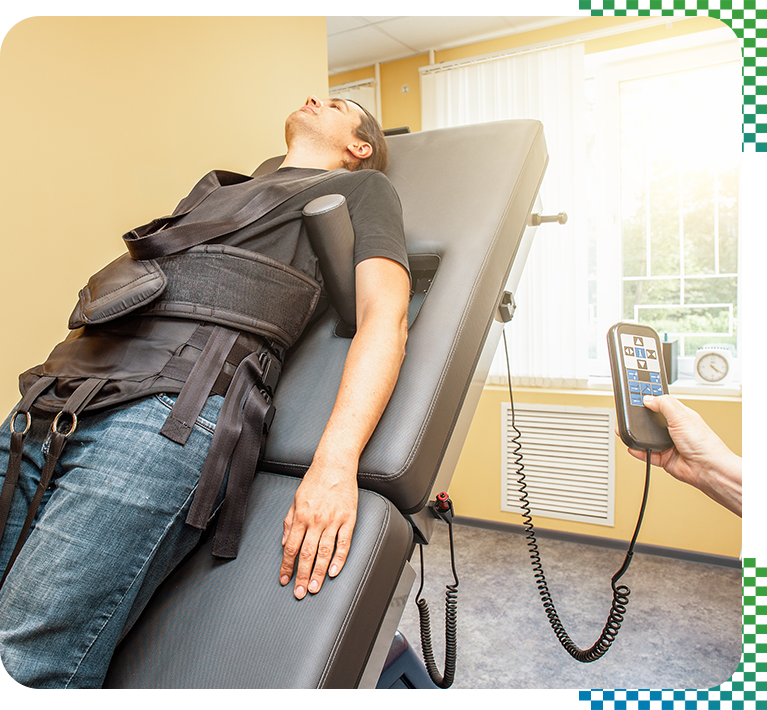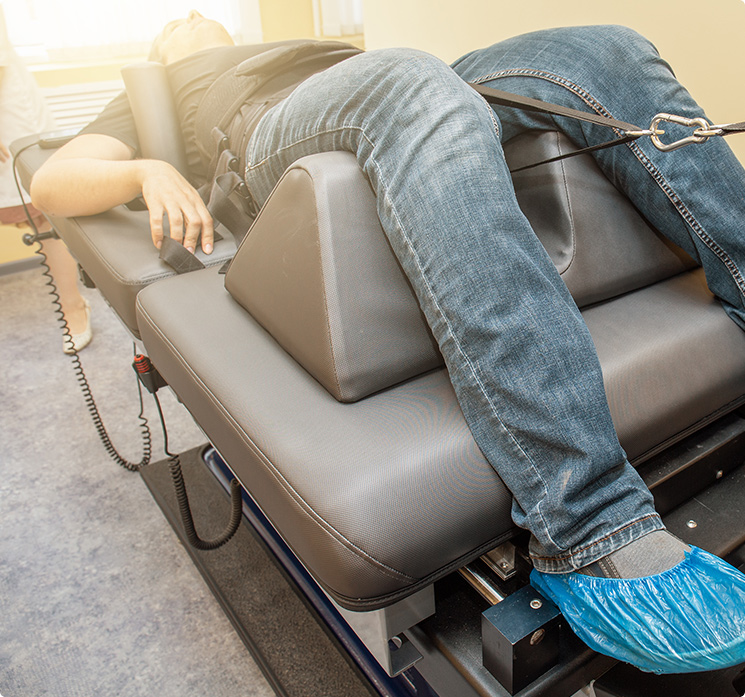Could you imagine going through life every day with near-debilitating, chronic back pain? Back pain is one of the most common ailments in America - it's estimated that 8% of all adults, or 16 million people, suffer from chronic back pain in the U.S. every year. If you've never experienced a back injury or pain, be thankful. Chronic back pain affects every aspect of a person's life, from participating in sports to limitations with everyday activities, like cooking dinner. In fact, many people with chronic back pain can't even make a reliable living and put food on the table. Almost 83 million workdays are lost every year due to choric back pain.

The inability to work and provide isn't just a physical issue - it can become an emotional one too. Many people suffering from chronic back pain also suffer from depression and anxiety. Unfortunately, in the past, chronic back pain sufferers wanting to avoid addictive medications and invasive surgeries had few viable relief options. However, if you're suffering from a chronic back issue like sciatica, a pinched nerve, or a bulging disc, pain relief may be closer than you think.
Modern chiropractic care and, more specifically, a spinal decompression chiropractor in North Charleston, SC, may be the long-term solution you need for chronic back pain.
A common misconception is that chiropractors only adjust your back and neck when, in fact, they treat the whole body with all-natural treatments. Here at Elite Healthcare, our doctors focus on your overall health, not just pain. We want to find and address the underlying causes of your symptoms. If you're unfamiliar with an integrative approach to medicine, this strategy may seem new. Our chiropractic care is less about putting a band-aid on the problem and more about finding a natural, long-term solution to your pain.
Fortunately, our experienced chiropractors provide the best in natural pain relief. Prescription and over-the-counter pain medications mask the symptoms you're experiencing versus getting to the cause of your pain. Pain is often the result of your spine being out of alignment, which leads to nerve issues. Once your spine is back in alignment, the nerves function correctly again.
Because our chiropractic center offers a combination of different therapies and non-surgical treatments, we provide a comprehensive approach to healing. Depending on the extent of your back problems, spinal decompression therapy may be the answer to your chronic pain problems.
Initially developed in 1985 by Dr. Allan Dyer, spinal decompression has been used by chiropractors for years. Unfortunately, spinal decompression is often passed over as a viable treatment, despite its numerous benefits.
In the past, patients suffering from chronic back pain issues like herniated discs were usually prescribed powerful medications. They were instructed to refrain from physical activities, referred to a physical therapist, and sent on their way. While physical therapy has an important role in back pain recovery, some back conditions need a more comprehensive treatment approach. For those patients, surgery seemed like the only option.
Today, patients with chronic back pain have many more options to consider. One of the most effective treatments for serious back pain is spinal decompression. This proven therapy, provided by Elite Healthcare, has been shown to significantly reduce pain and help patients live a normal, even active lifestyle once again.

Spinal decompression, also called Lumbar Cervical Decompression Therapy (LCD Therapy), is a very effective non-surgical solution to chronic back pain problems. If you're like most patients, your back pain is caused by disc issues related to your spine. This type of therapy uses computer technology and a spinal decompression machine in cityname, state, to stretch your spinal column slowly and gently, relieving abnormal pressure on the discs in your back, which sit in between your vertebrae.
This precise stretching action causes negative pressure to form inside the discs in your back, making them retract. With time, this negative pressure causes a reverse vacuum of sorts that actually draws your protruding discs into place. When pressure is removed from the disc segments in your spine, you experience much-needed pain relief.
The primary purpose of spinal decompression therapy is to provide you with immediate pain relief while creating a healthy environment to heal your spinal disc condition. Some of the most common conditions that spinal decompression therapy treats include:
This happens when spinal discs in your back are pushed outside of the spinal canal. When pushed outside of their usual space, these discs can put pressure on the nerves in your spine, resulting in localized pain and pain throughout your body. If a bulging disc is left untreated, it has a high chance of rupturing, which can necessitate surgery and longer recovery time.
Herniated discs are discs in your back that fracture or crack and leak fluid. The fluid or gel that leaks from a herniated disc may irritate the nerves in your back. When this happens, you may experience an intense burning sensation that shoots up and down your lower back and legs.
As you grow older, joints in your body, like your knees and hips, begin to wear away with time. The same thing can happen to the discs in your back. Often caused by heavy lifting or a family history of spine problems, degenerative discs are painful and can lead to serious situations. In advanced cases, bone spurs can form and affect the nerves of your spine.
When a herniated disc or bone spur begins to put pressure on the nerves in your back, it often causes sciatica. Sciatica is a common back problem that causes pain to radiate from your lower back down your legs via your sciatic nerve. Sometimes, this pain is only felt in one of your legs.
This condition is similar to arthritis of your spine, where the cartilage inside your facet joint breaks down and becomes inflamed. The result is often intense neck and back pain. It's most often caused by degenerative changes in the joints located between the bones of your spine.
This painful condition manifests when the space in your backbone is too small. When this happens, pressure impacts your spinal cord and the nerves that travel through it. Like other conditions treated by a spinal decompression therapy cityname, state, stenosis is caused by wear-and-tear in your back, which forms arthritis.
This term is often used to classify a range of back problems, most often caused by a pinched nerve root in your spinal column. This pinched nerve root may occur in different locations down your spine, like the lumbar or thoracic areas. Usually caused by a narrowing of the space where your nerve root leaves the spine, symptoms of this condition include pain, tingling, numbness, and weakness.
If you're looking for a safe way to relieve your chronic back pain, spinal decompression should be on your list of treatments to consider. This painless procedure is backed by research showing higher success rates in many patients when compared to spinal surgery. Unlike many medications, spinal decompression from Elite Healthcare Physical Medicine is designed to correct the condition you're facing while also minimizing costs and eliminating recovery and downtime.
Some of the most popular reasons why patients choose spinal decompression over surgery and other treatments include:
Invasive procedures, like back surgeries, often leave the patient racked with pain, long recovery times, and complications. Sometimes, the surgery doesn't work as intended, leaving the patient responsible for a therapy that didn't work correctly. As a non-invasive treatment, spinal decompression therapy can treat back and neck pain without needles, incisions, or harmful manipulations of the spine.

Getting back pain relief from surgery is far from guaranteed. However, because spinal decompression targets the underlying causes of your back pain, it's a much more effective long-term treatment. Spinal decompression is not a quick fix. When coupled with positive lifestyle changes like losing weight, you can maximize the pain-relieving benefits of spinal decompression.

Surgery of the back and spine requires the patient to be bedridden and uncomfortable for days and even weeks. Recovering from back surgery is no easy feat and often requires strong pain medications to help. Sometimes, back surgeries don't go as planned, causing complications and worse scenarios. Spinal decompression, on the other hand, is very effective and doesn't require much recovery time at all. Once your spinal decompression session is over, you'll probably be able to drive yourself home from our office.

One of the least talked about issues with back pain medications is that they only treat the pain, not the underlying causes. For many patients, relying on meds to relieve back pain fosters dependency on pain pills. Pain pill addiction is a very serious issue in the U.S., often leading patients down a dark path. With spinal decompression, you won't have to worry about taking pills for pain relief. That's because the root causes of your back pain are addressed, not just the symptoms.

If you were to look at the cost of surgery and subsequent years of prescription medication, you might be shocked. When compared to spinal decompression, surgery is a much more expensive treatment to consider. You've got to take the cost of surgery into account, but also the fact that you'll be forced to take time off work. By choosing spinal decompression therapy, you're choosing a safe, non-surgical treatment that doesn't require any time off work.

Spinal decompression relieves pressure on disrupted discs, causing them to retract back into place. This revolutionary treatment also lets oxygen, fluids, and nutrients re-enter your spinal discs, which provides additional healing.
 (843) 936-6238
(843) 936-6238

By now, you probably have a better idea of how spinal decompression can help rid your life of back pain. But spinal decompression treatment does more than help with bulging discs, herniated discs, arthritis, and more. It has also been shown to provide patients with important quality-of-life benefits.

As mentioned above, harsh surgeries leave you bedridden and unable to work for long periods of time. Spinal decompression allows you to jump right back into the workforce, so you can continue providing for your family. Plus, reducing your back pain naturally increases your mobility since you won't be stressing about hurting yourself while moving. Instead, you'll be living in the moment.
One of the worst symptoms affecting people with back pain is the inability to sleep well. Sleeping with back pain can be horrible, causing you to toss and turn to find a comfortable spot. As soon as you find one and get settled, your back starts to hurt again. It's a vicious cycle, but adjusting your spine and relieving pressure with spinal decompression will help you get a good night's rest.
Did you know that when your spine is decompressed, it helps fluids circulate throughout your body? These fluids actually flush your lymphatic system, which helps support your overall immune system. Better circulation also benefits your brain and can help boost concentration and memory. The improved circulation from spinal decompression may also distribute oxygen and nutrients to your skin, creating a multi-benefit effect.
We are happy to answer your questions, and help you find the services you need. Please message us to get started.
At Elite Healthcare Physical Medicine, we practice an integrated approach to pain relief and chiropractic care. Our goal is to restore your spine to its proper alignment, which speeds up your recovery time and prevents additional injuries. If chronic back pain has taken over your life, it's time to visit our chiropractic office for a thorough evaluation.
Ask yourself this: Have you been suffering from headaches and sleepless nights due to muscle strain? Is your ability to work and put food on the table compromised due to a pinched nerve? No amount of over-the-counter pain medication can provide a long-term fix for such an issue. Thankfully, our chiropractors have years of experience providing relief to patients just like yourself.
After a comprehensive exam, our doctor will create an individualized treatment plan tailored to your body. That way, we can address the full scope of your symptoms by correcting any root causes of your back pain.
From minor chiropractic adjustments to spinal decompression treatment, we'll find the solution that your back and body need to heal correctly. If you're ready to get back on the road to better health, we're here to help every step of the way. Contact our Elite Healthcare Physical Medicine today to get started.
 (843) 936-6238
(843) 936-6238
It requires time, patience and purpose.The S.C. State Ports Authority's $105 million acquisition of the former WestRock paper mill along the Cooper River in North Charleston is a textbook example. A decade or more will likely pass before the 280-acre waterfront property will begin its next life as a sizable shipping terminal."It's going to take a lot of preparation before that site could ever be utilized," SPA chief executive Barbara Melvin told lawmakers at a hearing in Columbia last week.The sale of the mill ...
It requires time, patience and purpose.
The S.C. State Ports Authority's $105 million acquisition of the former WestRock paper mill along the Cooper River in North Charleston is a textbook example. A decade or more will likely pass before the 280-acre waterfront property will begin its next life as a sizable shipping terminal.
"It's going to take a lot of preparation before that site could ever be utilized," SPA chief executive Barbara Melvin told lawmakers at a hearing in Columbia last week.
The sale of the mill with its 5,000 feet of future berth space along the Cooper River was finalized April 26, according to real estate documents recorded last week with the Charleston County Register of Deeds.
As part of the deal, WestRock Co. included a swath of undeveloped land off Jedburg Road near Summerville.
The Atlanta-based packaging company and successor to the old Westvaco Corp. announced a year ago it would shut down the 500-worker papermaking plant by late summer after 86 years, citing a "combination of high operating costs and the need for significant capital investment."
WestRock also stated that it was preparing the property for sale.
The SPA was an eager buyer for an obvious reason. The manufacturing site off Virginia Avenue near I-526 will enable it to more than double the size of its North Charleston Terminal right next door.
"It's very exciting for us when we're able to integrate that property into an existing facility," Melvin said.
Just not anytime soon.
The conversion from paper mill to port isn't projected to be needed or completed until the 2030s or possibly the 2040s, Melvin projected.
The acquisition is one piece in a complicated and expensive transportation puzzle that requires several other big-ticket projects to fall into place. All are tied to the emergence of supersized container vessels that the SPA and many other port operators are scrambling to accommodate to stay competitive.
Among the first items on the to-do list is the completion of the SPA's 3-year-old deepwater Leatherman Terminal a few miles away on the former Navy base.
Another is the proposed replacement of the nearby Don Holt Bridge with a higher span that will allow the mega-vessels to safely pass under I-526.
Also, the navigation channel in that section of the Cooper will need to be deepened by several feet.
For those reasons, Melvin said, the WestRock property “is not the next increment of capacity for us."
"We will build out the Leatherman Terminal before we move to that area because to utilize fully the paper mill site, along with any kind of modernization to our North Charleston facility …. we need to be able to handle the biggest ships there," she said.
Melvin and her predecessors at the SPA have stressed that planning how and where the port adds new berths and wharf space is a multigenerational process. it often requires early upfront investments and involves lengthy time horizons that can stretch decades into the future.
“Just permitting, financing, planning … all of that takes a lot of time," she said.
While the WestRock closure was regrettable based on the job losses, it also was a fortuitous once-in-a-lifetime chance for the port to secure and recycle an environmentally challenging site that will provide enough expansion space until at least mid-century, based on current projections.
“This is the future," Melvin told lawmakers, who are expected to provide $55 million in state funds to close the deal. "Port activity really takes 20, 30, 40 years sometimes to plan. And if we had not grabbed this opportunity with the WestRock property, in 20 years, whoever is sitting in this seat should have to answer the question, 'Who was asleep at the switch?' And that would have been me.”
The North Charleston Terminal is now the smallest of the SPA's three box-ship hubs, with five cranes that can move up to 500,000 containers annually.
Once the mill property is added to the mix, it'll be able to handle 10 times as much cargo, making it, by far, the largest.
The hearing — to be held at 6 p.m. at City Hall — was mandated by the Environmental Protection Agency last year, which ordered the S.C. Department of Health and Environmental Control to give residents near the plant an opportunity to express their concerns about the proposed changes.
The permit regulates the amount of air pollution the company can create as part of its manufacturing process at the Mount Holly site. Century has proposed an increase in the amount of sulfur dioxide generated at the smelter. The permit also would let the smelter increase the amount of particulate matter released into the air by more than 46 percent, to 503 tons a year.
DHEC initially approved Century’s application as a minor revision to an existing permit, which doesn’t require a public comment period.
A pair of environmental groups, the Sierra Club and Environmental Integrity Project, filed an objection with the EPA. They said the changes should have instead been treated as a major revision, which calls for a 45-day public comment period.
The EPA agreed, saying in a Nov. 2 order that “the public was deprived from the opportunity to meaningfully participate” in the permitting decision, as required by the federal Clean Air Act.
Doors will open at 5:30 p.m. at 519 N. Goose Creek Boulevard. While DHEC officials will be on hand to hear comments they won’t be allowed to answer questions. A court reporter will document the comments.
The public can also submit written comments online, via email at AirPNComments@dhec.sc.gov or by mail at Bureau of Air Quality, air permitting division director, 2600 Bull St., SC 29201. Comments must be received no later than June 3.
The air permit isn’t related to an issue the 44-year-old smelter experienced last year when alumina dust escaped a pollution-control system and settled on nearby homes and cars.
Plant officials said Century fixed the problem by descaling its emissions system and replacing collector bags that capture the dust.
The Port of Charleston reported a 12 percent year-over-year jump in containerized cargo moving through its terminals in March — the biggest increase of the year and a sign that the nation’s port industry is stabilizing after an uncertain post-pandemic period.
The SPA said its terminals handled the equivalent of 216,410 20-foot cargo boxes in March for the highest single-month tally since October and the second-largest in more than a year. Imported cargo was up 15.4 percent compared with the same month a year ago.
“The U.S. East Coast is in high demand for cargo routings, and our strategic location in the booming Southeast positions us well for long-term growth,” Barbara Melvin, the SPA’s president and CEO, said in a written statement.
The SPA said “the significant container volume boost points to signs of economic strength and a strong market” in the Charleston region and throughout the Southeast.
The number of vehicles moving through the port’s Columbus Street Terminal totaled 18,001 in March — a 15 percent increase due largely to exports of BMW sport-utility vehicles built at the German automaker’s Upstate plant.
The SPA’s top competitors in the Southeast also saw strong growth in containerized cargo in March.
The Georgia Ports Authority said it handled 436,000 20-foot containers during the month for an 18.5. percent year-over-year increase. Imports at the Port of Savannah grew by nearly 24 percent.
The Virginia Ports Authority reported a 17.2 percent uptick in March, driven largely by a 19 percent jump in imports moving through the port in Norfolk.
The National Retail Federation said this month that imports are on the rise for U.S. ports, with a 7.2 percent jump expected once April figures are reported and a forecast 24.3 percent increase for May.
It will take a few more months to determine whether internet giant Google must disclose how much water it intends to use to cool the servers at a new data center planned for Dorchester County.
Charleston County resident Frank Heindel sued the county last month after Google’s projected water and sewer usage was redacted in a document he requested under the S.C. Freedom of Information Act. The county has said the information qualifies as a protected trade secret under state law — an assertion that Heindel says is false.
A court hearing was held May 2 at which lawyers in the case requested a continuance. A state court judge is now scheduled to hear the case on Oct. 22.
South Carolina law allows industries to shield trade secrets from public view but only if the information includes “commercially valuable plans, appliances, formulas or processes which are used for the making, preparing, compounding, treating or processing of articles or materials which are trade commodities.”
Google’s water-consumption data “does not fall within the definition of trade secrets” allowed by state law, according to Heindel’s lawsuit.
Dorchester County has asked that the case be dismissed.
Google has proposed construction of two data centers in Dorchester County — one near St. George and the other west of Summerville at the Pine Hill Business Campus. They would join an existing Google data center in Berkeley County.
Construction is underway on the area’s first The Fresh Market in Bowman Place Shopping Center at 1118 Bowman Place, between Dick’s Sporting Goods and DSW.Peter Stone, a senior planner with the town, said the design and all permits have been granted to move the project forward.The Fresh Market did not respond to requests for comment, but employees at the neighboring DSW shoe store said they’ve been told the store is expected to...
Construction is underway on the area’s first The Fresh Market in Bowman Place Shopping Center at 1118 Bowman Place, between Dick’s Sporting Goods and DSW.
Peter Stone, a senior planner with the town, said the design and all permits have been granted to move the project forward.
The Fresh Market did not respond to requests for comment, but employees at the neighboring DSW shoe store said they’ve been told the store is expected to open in 2025.
Some of the parking in the Bowman Place lot has now been fenced off for construction, while inside the store, workers are breaking ground and tearing up the concrete floor that previously housed Kitchen & Co.
The Fresh Market signed a deal last year to slip into the 26,000-square-foot space that was originally to be occupied by a discount grocer: Lidl added 6,000 square feet and a loading dock but never opened its doors at Bowman Place.
The Fresh Market, based in Greensboro, N.C., has assumed the remainder of the 15-year lease Lidl signed around 2021, with an option to extend the terms for another 15 years, according to Charleston County real estate records.
The chain has nine grocery stores in South Carolina, including three along the coast in Hilton Head, Pawleys Island and Myrtle Beach.
Out with the old and in with the new.
Following the closing of Gold’s Gym at 5101 Ashley Phosphate Road in North Charleston, a Planet Fitness will be taking over for its third location in the city.
A spokesperson for the Hampton, N.H.-based chain said it’s tentatively scheduled to open in the late summer or early fall.
”We are looking forward to helping the North Charleston community improve their physical and mental wellness in our newest judgement free zone,” the spokesperson said.
Planet Fitness operates more than 50 gyms in South Carolina, according to its website .
An Italian eatery inside Citadel Mall will close April 30.
The small-scale Bella Roma serves up favorites like chicken parmesan, fettucine alfredo and cannoli to go. Owners Fabio and Barbara Spadaro shared news of the closing on their Facebook page .
The duo will not be opening any other local ventures, citing “For family reasons we decided to go back to Italy. We invite everyone to support us until the end of the month.”
A kitchen, bath and closet design center will open a new Charleston location April 25.
The Designery Charleston, owned by Nate Van Valkenburg, is ready for launch at 1217 Remount Road. Inside the showroom, customers can personally design their kitchen and view finish selections for 100 cabinet styles.
Van Valkenburg also owns a Window Hero and a Yard Patrol Pros in the area, which along with The Designery Charleston are franchised by HomeFront Brands.
The Carnes Crossroads Farmers Market in Goose Creek returns April 26 from 5 to 8 p.m.
The event, which takes place every fourth Friday through September at 513 Wodin Place, features more than 50 vendors, including local farmers and entrepreneurs, as well as live music and food trucks.
A week later, on May 4, the fourth annual Ravenel Depot Farmers Market will be starting back up at 5775 S.C. Highway 165 at the town’s train depot. It takes place on the first and third Saturday of the month through Dec. 14 from 9:30 a.m.-1 p.m.
In addition to live music and food trucks, roughly 20 vendors will be on hand with fresh produce, breads and baked goods, local crafts, artwork and more.
Going green
A South Carolina commercial landscape business is growing more than grass.
The Greenery Inc. is expanding its footprint with a new branch at 5080 Coosaw Creek Blvd. in North Charleston.
The company offers commercial landscape services to resorts, municipalities, industrial and commercial businesses, planned communities and more in Greenville and Spartanburg, as well as Bluffton, Beaufort, Savannah and Hilton Head Island, where it was started in 1973.
The company also has Florida offices in Jacksonville, Amelia Island and Daytona.
“We have been serving the Charleston market since 1999,” CEO Lee Edwards said. “It’s the second-largest market that we are in, and we think it’s going to be a huge part of our future through our strategic plan and our employee-owned leadership.”
NORTH CHARLESTON, S.C. (WCSC) - The future of land in North Charleston lies in the hands of city council members, and it’s a breath of relief for concerned community members and a strain for the company urging its industrial use.The city council will be the next step forward for the proposed plan after a request to rezone two parts of the former Baker Hospital property on the Ashley River. They will vote on whether the land will be rezoned from R-1 residential to M-2, heavy industrial and M-1, light industrial.The city&rs...
NORTH CHARLESTON, S.C. (WCSC) - The future of land in North Charleston lies in the hands of city council members, and it’s a breath of relief for concerned community members and a strain for the company urging its industrial use.
The city council will be the next step forward for the proposed plan after a request to rezone two parts of the former Baker Hospital property on the Ashley River. They will vote on whether the land will be rezoned from R-1 residential to M-2, heavy industrial and M-1, light industrial.
The city’s Planning Commission on Monday voted 5-1 to deny the recommendation to rezone before passing it onto council - saying it didn’t align with the best interest of the city’s comprehensive plan, the location to the Ashley River and the public interest of surrounding neighborhoods.
The land, defined as a brownfield, is a property, the expansion, redevelopment, or reuse of which may be complicated by the presence or potential presence of a hazardous substance, pollutant, or contaminant, the Environmental Protection Agency says.
“We don’t need industry in our living rooms. We don’t need to breathe the fluid of industry in our neighborhoods. We don’t need to be impacted negatively that way,” Union Heights resident Skip Mikell says.
The Charleston County Parks and Recreation Commission and Sea Fox Boats have a 90-year lease with the goal of building a manufacturing plant on 11 acres of the 46-acre property. Sea Fox Boats owner Freddy Renken says they plan to bring 200 or more jobs to the area and will fund the construction of a waterfront public park.
The commission says rent paid by Sea Fox Boats and its dry stack marina would offset operations and maintenance for the park. Nothing has been finalized or started because this is in a due diligence phase.
The park itself would have the following amenities:
Renken did not speak at the meeting but a company lawyer shared insight on his behalf:
“What is there not to want about this? To turn a brownfield into a park that provides jobs and an economic engine. With Sea Fox Boats, the City of North Charleston will be able to build planes, cars, boats. I think that is pretty cool,” Ronald Richter says.
Despite the push for approval, a resounding “no” was heard from a crowd of North Charleston homeowners and supporters. They say the company never shared its plans with surrounding neighborhoods and businesses, including Union Heights, Chicora-Cherokee and Accabee.
Mayor Reggie Burgess also pushed for a full recreational park option to be considered following the initial plan release.
Charleston County Parks states in this press release they planned on releasing public input meeting dates in early 2024. As of now, no updates have been provided.
The commission released the following statement:
The Charleston County Park and Recreation Commission (CCPRC) recently entered into a public-private partnership with the locally-owned Sea Fox Boat Company at its Ashley River site. The company is in a two-year due diligence phase, which includes addressing zoning and permitting issues.
Per the partnership, Charleston County Parks would continue to own the entire property, with tenant Sea Fox funding the creation and maintenance of the future public park. This would allow Charleston County Parks to develop and operate the park without taxpayer funds. Because of the site’s history as the former Baker Hospital and as a phosphate processing plant, it has created a brownfield that will require costly environmental efforts to make it suitable for recreational use.
The future county park would offer residents green space and views of the Ashley River. Other possible amenities at the park include a fishing/crabbing dock, trails, playground, splash pad, shelter for camps or programs, and unique event space. Public input meetings will be held to learn what the communities would like to see on the site. Once the zoning process has been completed, we will determine the timeline for the public input meetings.
Seventeen people spoke in opposition to the plan. Neighbors say adding the plant would not benefit their community in terms of work or play and are asking for the area to be solely a park.
“The neighborhoods we represent have some of the lowest unemployment rates in North Charleston. Chicora-Cherokee specifically has a 2.9 unemployment rate, which means our people are already working,” KJ Kearney says.
The planning commission stated in the agenda item they recommended denial because they believe the property’s location to the Ashley River makes the plant unfeasible and there is a “lack of support” to the city’s comprehensive plan.
Sea Fox Boats argues the area they are requesting rezoning for is on a brownfield, the former site of a phosphate processing plant and hospital, which would need environmental maintenance to make the area suitable for recreational purposes or greenspace.
North Charleston natives say they remember the smells, the sights and the feelings of growing up near the former plant and the concerns it raised for health and wellness.
“Those people don’t live here. So whatever damage they do, they leave at the end of the shift and go home. We live here and if there’s anything that we can do to prevent that kind of thing reoccurring. We’re going to do so,” Mikell says.
The site was donated to Charleston County Parks in 2015 by Charleston residents Michael and Jenny Messner of the Speedwell Foundation. The organization did not respond to a request for comment.
“The owner of that property is the Charleston County Parks and Recreation. Their purpose for being is to create parks, preserve and protect greenspaces,” Richter says. “We are not looking for the high bidder here, we are looking for the perfect partner to clean this place and make it a place of pride.”
The discussion will now go before city council starting on April 11 for its first reading. The next opportunity for public input will be on April 18.
For more information on the project, click here.
Copyright 2024 WCSC. All rights reserved.
CHARLESTON, S.C. (WCSC) - A Charleston County teacher is using animals to remind her students they can find peace inside and outside of the classroom.Jordan Adams is an elementary school counselor and says her job is to make sure her students enjoy coming to school every day. Adams has been the school counselor at Harbor View Elementary for 13 years. Adams says even though she plans her days ahead, she never knows what the day might bring. One of her big focuses for all of her students is social emotional learning.She says it i...
CHARLESTON, S.C. (WCSC) - A Charleston County teacher is using animals to remind her students they can find peace inside and outside of the classroom.
Jordan Adams is an elementary school counselor and says her job is to make sure her students enjoy coming to school every day. Adams has been the school counselor at Harbor View Elementary for 13 years. Adams says even though she plans her days ahead, she never knows what the day might bring. One of her big focuses for all of her students is social emotional learning.
She says it is important to help students understand complex emotions at an early age before they enter adulthood, which is where the social emotional learning Piggy Project all began.
It started when Adams’ son asked her for a guinea pig during COVID when social distancing was at an all-time high. As an avid animal lover, Adams gave her son the guinea pig Oreo. But she said she couldn’t help but feel the animal was lonely. By the time school began that August, Adams housed three guinea pigs and wanted to share them with the students.
“The school day is a long day,” Adams says. “The kids work really hard, and I want them to love school. They may not love everything about it, but they should enjoy coming to school for the most part. Even if they’re able to just visit with the guinea pigs, if that gets them to the school, it makes my day.”
Adams plans to have the guinea pigs as calming animals for the students as long as she can.
She says her guinea pigs eat quite often and she feeds them mostly hay as a snack. Through budgeting and planning to make sure the program continues, she needs help supplying the pigs with the constant nutrients they need.
Click here to become a Classroom Champion by donating to Adams’ Piggy Project through Donors Choose.
All donations to Donors Choose are tax-deductible. Donors Choose collects your money, then buys the items and sends them to the teacher. This ensures that your donation is used for our area teachers.
Copyright 2024 WCSC. All rights reserved.
CHARLESTON, S.C. (WCBD) – The South Carolina Ports Authority announced Tuesday it plans to purchase the former WestRock paper mill site in North Charleston to “further expand port capacity.”WestRock announced in May 2023 that it would ...
CHARLESTON, S.C. (WCBD) – The South Carolina Ports Authority announced Tuesday it plans to purchase the former WestRock paper mill site in North Charleston to “further expand port capacity.”
WestRock announced in May 2023 that it would close the mill in late August, citing high operating costs and the need for significant capital investment as the driving factors behind the closure.
The SC Ports Board of Directors voted on Tuesday morning to move forward with a purchase sales agreement with WestRock. While the SC Ports did not provide a timeline, they said the transaction is expected to close “as soon as practical.”
Port officials said they also received support from the state for the project.
“South Carolina Ports is widely known as a top driver of our state’s booming economy, but that success doesn’t come by accident — it takes timely, strategic investments like this one. Every time we invest in port infrastructure, we see significant success at port-dependent businesses and new, good-paying jobs for our people. Our state’s investment in the expansion of North Charleston Terminal will yield dividends and create opportunities for future generations,” said Governor Henry McMaster.
“The tremendous backing from our state and an excellent partnership with WestRock allows us to make investments today that will support our state’s economy and create opportunities for future generations of South Carolinians,” said SC Ports President and CEO Barbara Melvin. “We are adding significant port capacity to support growth in South Carolina and throughout the Southeast.”
The approximately 280-acre property sits adjacent to the North Charleston Terminal. SC Ports leaders say the former paper mill site will offer a natural extension of the container terminal allowing them to handle more cargo for port-dependent businesses.
It could expand the terminal’s capacity to handle five million containers in the future and create 5,000 feet of linear berth space for container shops, and around 400 acres of terminal space for cargo.
Port officials said the South Carolina Department of Transportation (SCDOT) is playing a key role in the project. They are planning to expand I-526 and will replace the Don Holt Bridge, which would remove height constraints for larger vessels.
“Plans are also underway to achieve a 52-foot depth up to North Charleston Terminal. The U.S. Army Corps of Engineers, Charleston District, is undertaking a feasibility study — a critical first step toward deepening this stretch of the Cooper River an additional five feet,” the SC Ports said in its release.
Leaders say the deepening and new bridge height will allow bigger ships calling the Port of Charleston to seamlessly access the North Charleston Terminal.
